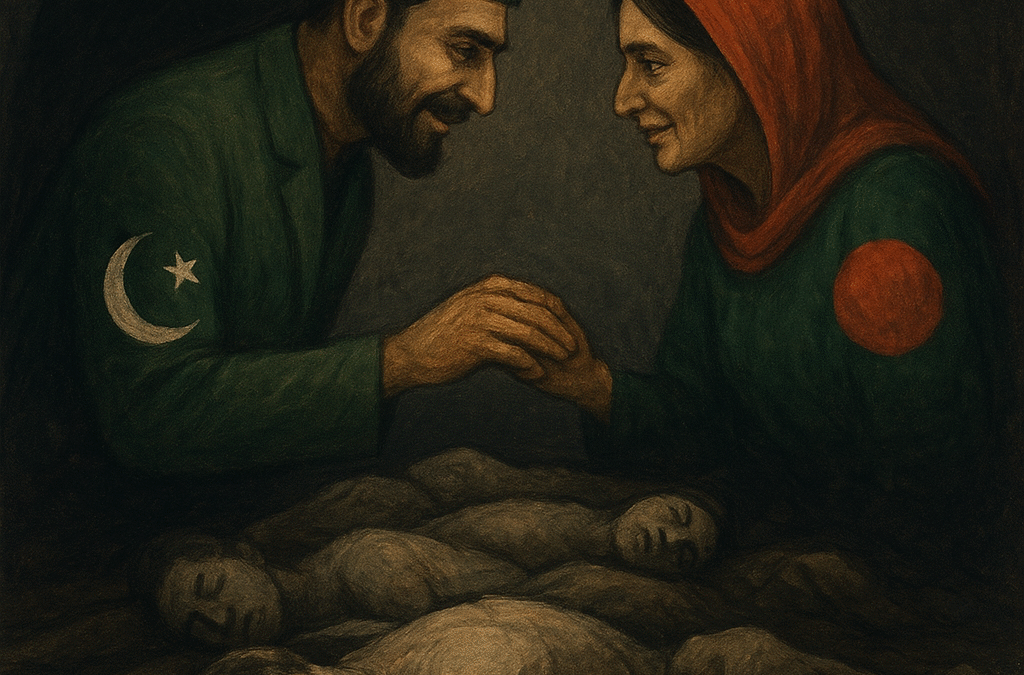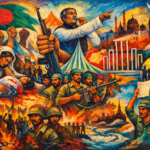History has a cruel way of repeating itself—especially when nations willfully erase their scars and invite their tormentors back into the parlour. Bangladesh today finds itself at such a tragic juncture. Fifty-four years after the unpunished genocide of 1971, the same country that raped, plundered, burnt villages to ashes, and butchered three million Bengalis, is now being welcomed with handshakes, bilateral agreements, and warm diplomatic smiles.
Yes—Pakistan. The nation whose military junta oversaw the bloodiest chapter of South Asia’s modern history, and whose ruling elite have never once apologised for their crimes. Instead of demanding justice, reparation, or even a symbolic admission of guilt, Dhaka’s current posturing reeks of political amnesia and monumental stupidity.
The Genocide That Remains Unpunished
From March to December 1971, Pakistan’s army, backed by collaborators, launched one of the most systematic campaigns of terror the 20th century had witnessed. Operation Searchlight alone turned Dhaka into a graveyard overnight: students dragged out of dormitories and shot; professors bayoneted before their families; women raped in military camps that doubled as rape factories; villages burnt in “scorched earth” operations.
-
Estimated 3 million killed, 400,000 women raped, and 10 million refugees forced into India for shelter.¹
-
The Hamoodur Rahman Commission Report—Pakistan’s own suppressed military inquiry—admitted to mass killings, arson, and brutality.²
-
International journalists such as Anthony Mascarenhas in the Sunday Times described it as “genocide” as early as June 1971.³
Yet today, Bangladesh’s leaders—custodians of that very Liberation legacy—are extending olive branches to Islamabad as if these rivers of blood never flowed.
The Dangerous Illusion of “Bilateral Goodwill”
Supporters of this newfound bonhomie will argue: “The past is past, let us move forward with trade, visas, and people-to-people contact.” But history teaches us that Pakistan’s handshakes always conceal daggers.
-
From 1972 onward, Pakistan provided sanctuary to anti-Bangladesh elements like the razakars and Al-Badr ideologues who fled justice.
-
In the 1980s–1990s, Pakistan’s ISI used Dhaka as a transit hub for arms smuggling into India’s northeast insurgencies.⁴
-
Terror outfits such as HuJI-B (Harkat-ul-Jihad-al-Islami Bangladesh) drew direct inspiration, training, and funding lines from Pakistan’s militant networks.⁵
So when visa-free travel and expanded bilateral trade are now paraded as “progress,” the obvious question is: progress for whom? For ordinary Bengalis who still carry the trauma of 1971? Or for Pakistan’s deep state, which once again finds a gullible neighbour willing to play host to infiltrators, handlers, and subversive operatives under the guise of “government employees”?
Betrayal of the Liberation War Legacy
Let us be brutally honest: this policy is betrayal, not diplomacy.
-
Betrayal to the martyrs whose blood consecrated Bangladesh’s soil.
-
Betrayal to the raped mothers and sisters whose tormentors never stood trial.
-
Betrayal to the millions who fled to India in 1971, finding shelter when Pakistan sought their annihilation.
What makes this betrayal even more grotesque is the cosiness of this new embrace—Dhaka and Islamabad now sitting on each other’s laps, giggling about “regional stability,” when in reality, every such intimacy chips away at the very foundation of Bangladesh’s sovereignty and its hard-won independence.
The Regional Consequence: A New Theatre of Subversion
South Asia cannot afford another cycle of subversion. Already, Islamist radicalism is making alarming comebacks in Bangladesh, fuelled by both internal opportunists and external enablers. By inviting Pakistan closer, Bangladesh risks:
-
Allowing covert ISI reactivation in Dhaka.
-
Fueling radical Islamist recruitment under the cloak of “cultural” or “religious” exchange.
-
Destabilising India’s northeast through smuggling, arms, and terror networks—a playbook Pakistan has perfected for decades.
It is naïve, almost suicidal, to think Islamabad’s intentions have suddenly turned noble. A leopard does not change its spots; Pakistan’s establishment is still wedded to the dream of revenge for 1971, of unsettling India by weaponising Bangladesh’s vulnerabilities.
Conclusion: Learning Nothing, Forgetting Everything
For a nation born out of rivers of blood, Bangladesh’s leadership today shows a shocking eagerness to forget. The ordinary citizen has not forgotten—their family stories, their village ruins, their lost ones still whisper through generations. Yet the ruling elite have chosen expediency over memory, commerce over conscience.
History will not forgive this monumental stupidity. In shaking hands with Pakistan without demanding accountability, Bangladesh is not just betraying its past—it is endangering its future.
References
-
Rummel, R. J. Death by Government (1994) – estimates of deaths during Bangladesh genocide.
-
Hamoodur Rahman Commission Report (1974, declassified 2000).
-
Mascarenhas, Anthony. “Genocide.” The Sunday Times (June 13, 1971).
-
South Asia Terrorism Portal (SATP). “Pakistan’s ISI and Northeast India Insurgency Links” (archival reports).
-
Abul Barkat, Political Economy of Fundamentalism in Bangladesh (2005) – tracing HuJI-B and Pakistan’s patronage.






